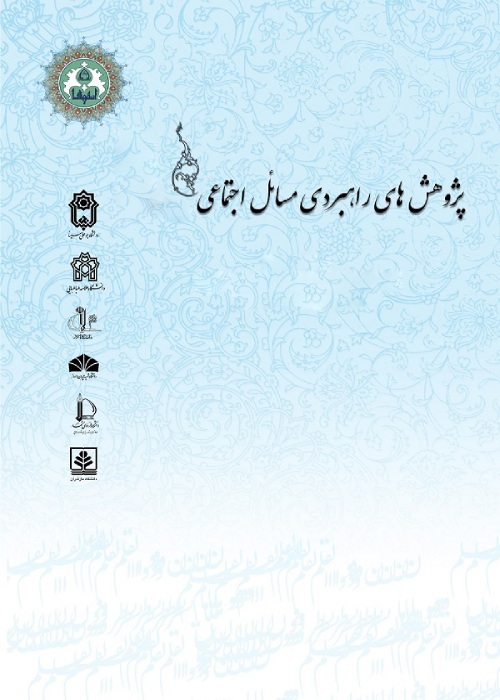Living with Problems: A Critical Ethnography of Dumpster Diving in the Industrial City of Meybod
Unbalanced industrial development and the lack of coordination of cultural, economic, and social structures in attracting the development criteria will lead to rapid developments in some structures and backwardness of other structures of society. The result of such a process is what we see in industrial cities today. In fact, the focus on industries in industrial cities has led to a massive flood of immigrants and created a variety of patterns of life in these cities, which causes many social damage, one of which is the phenomenon of Dumpster diving. In fact, Dumpster divers are a group of people, who informally collect, sort, process, and sell urban waste, thus earning their living through the collection and recycling of waste and its sale. It is important to address the issue of Dumpster diving from different angles. Firstly, it is crucial to thoroughly examine the negative consequences of Dumpster diving on Dumpster divers themselves, the general public, and the city as a whole. Secondly, the deprivation of fundamental rights for Dumpster divers is a pressing issue that needs to be addressed. Thirdly, the nature of their work and the conditions, under which they operate, give rise to numerous problems and injuries, posing a threat not only to the individuals involved, but also to the overall health of the community. Meybod, a small yet fully industrialized city, has experienced a significant rise in Dumpster diving. Consequently, both immigrants and native residents of the city, who are responsible and law-abiding citizens, express deep concern regarding this matter. The prevalence of this issue is evident in small cities like Meybod, where a significant number of waste collectors, who are part of the Dumpster diving community, operate. This situation is largely a result of the imbalanced industrial development witnessed in the past decade. Over the course of the last three decades, Meybod has experienced an annual influx of over 1,000 immigrants, leading to rapid social and cultural transformations within the city. Therefore, this research aimed to investigate the phenomenon of Dumpster diving within the context of unbalanced industrial development and mass migrations.
This research employed a methodological pluralism approach within a pragmatist paradigm, utilizing critical ethnography with Carspecken's approach. The data collection process involved a combination of participatory and non-participatory observations. Initial data reconstruction was conducted followed by in-depth interviews that focused on dialogue-oriented data collection. A total of 20 individuals were purposefully selected for interviews using a snowball method. The selection process prioritized diversity in terms of gender, education level, age, and other relevant factors. The researchers employed observation techniques, as well as semi-structured and deep interviews, to collect data. The findings from these interviews were categorized into several themes, including Dumpster diving contexts, Dumpster diving economy, exploitative family profiteering, waste city, living with problems, Dumpster diving as a gateway to crime, and institutional promotion of Dumpster diving.
In recent decades, advancements in science and technology have significantly improved the quality of life for people worldwide, addressing numerous diseases and poverty-related issues. However, these advancements have also led to a widening global inequality. This inequality has far-reaching consequences, not only economically, but also politically and socially. It can give rise to various social issues within each country and region, such as large-scale migration. These migrations, in turn, result in significant damages, one of which is the practice of Dumpster diving. Dumpster diving can be attributed to several factors, including unemployment, insufficient income, job loss, lack of government and organizational support (including insurance coverage), addiction, and lack of family support. Individuals may also turn to Dumpster diving due to their reluctance to beg for assistance. Additionally, some individuals perceive Dumpster diving as a lucrative option. In conclusion, while science and technology have brought about positive changes, the widening inequality poses significant challenges. The consequences of this inequality, including Dumpster diving, have profound social implications. Addressing the root causes of Dumpster diving, such as unemployment and lack of support systems, is crucial to mitigate its negative effects and promote a more equitable society. The findings indicated that Dumpster diving was a growing phenomenon directly linked to visible economic and class disparities. While individuals facing adversity in their lives engaged in Dumpster diving, it was the vulnerable and marginalized groups, including women and children, who were most affected and derived minimal economic benefits from this practice. The primary beneficiaries of this industry were the local managers, who controlled its profits. Consequently, this situation further exacerbated the complexity of structural class inequality.
- حق عضویت دریافتی صرف حمایت از نشریات عضو و نگهداری، تکمیل و توسعه مگیران میشود.
- پرداخت حق اشتراک و دانلود مقالات اجازه بازنشر آن در سایر رسانههای چاپی و دیجیتال را به کاربر نمیدهد.



